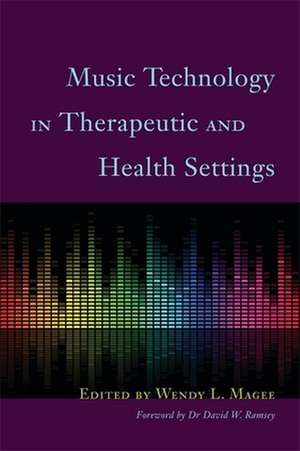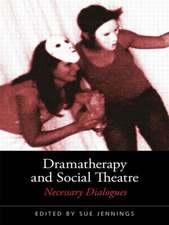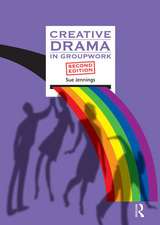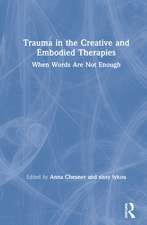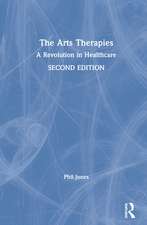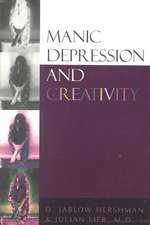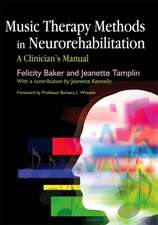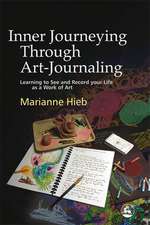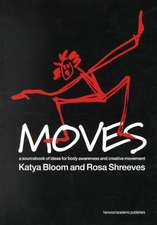Music Technology in Therapeutic and Health Settings
Editat de Wendy Mageeen Limba Engleză Paperback – 27 sep 2013
Preț: 274.07 lei
Preț vechi: 288.50 lei
-5% Nou
Puncte Express: 411
Preț estimativ în valută:
52.44€ • 54.75$ • 43.40£
52.44€ • 54.75$ • 43.40£
Carte disponibilă
Livrare economică 15-29 martie
Preluare comenzi: 021 569.72.76
Specificații
ISBN-13: 9781849052733
ISBN-10: 1849052735
Pagini: 399
Ilustrații: 19 b&w photos/figures
Dimensiuni: 151 x 230 x 20 mm
Greutate: 0.54 kg
Editura: Jessica Kingsley Publishers Ltd
ISBN-10: 1849052735
Pagini: 399
Ilustrații: 19 b&w photos/figures
Dimensiuni: 151 x 230 x 20 mm
Greutate: 0.54 kg
Editura: Jessica Kingsley Publishers Ltd
Notă biografică
Cuprins
Acknowledgements. Foreword by Dr David W. Ramsey, President and Co-Founder, Interactive Musically Assisted Rehabilitation Systems (i-Mars, LLC), USA. Preface. Section 1: Background and Overview to Technology and its Use in Therapeutic Contexts. 1. Setting the scene: An Overview of the Use of Music Technology in Practice. Susan Hadley, Slippery Rock University, Nicole Hahna, Slippery Rock University, Vern Miller, Pennsylvania Psychiatric Institute, and Michelle Bonaventura, Slippery Rock University. 2. Music Technology Used in Therapeutic and Health Settings: Definitions of Devices and Resources. Robert E. Krout, Southern Methodist University, Dallas, Texas and University of Queensland, Australia. 3. An Introduction to Using Assistive Devices in Music Therapy. Jane Bache, Compass Electronic Assistive Technology Service, Royal Hospital for Neuro-disability, Gary Derwent, Royal Hospital for Neuro-disability, and Wendy Magee, Temple University, Philadelphia. 4. Indications and Contra-indications for Using Music Technology with Clinical Populations: When to Use and When Not to Use. Wendy Magee. Section 2: Music Technology in Therapeutic Contexts with Children and Adolescents. 5. Music Technology in the Neonatal Intensive Care Unit. Andrea M. Cevasco, The University of Alabama, Tuscaloosa, AL. 6. Innovations in Medical Music Therapy: The Use of Electronic Music Technologies in a Pediatric Burn Hospital. Annette Whitehead-Pleaux, Shriners Hospitals for Children, Boston, and Lisa E. Spall, Roman Music Therapy Services, LLC. 7. Access to Music Making through Switch and Voice Output Technology for Young People with Multiple and Complex Needs in a School Setting. Julie Buras Zigo, Berklee College of Music, Boston, MA, and Franciscan Hospital for Children, Brighton, MA. 8. Using Music Technology with Children and Adolescents with Visual Impairments and Multiple Disabilities. Lisa Martino, Perkins School for the Blind, and Michael Bertolami, Perkins School for the Blind. 9. Engaging iPad Applications with Young People with Autistic Spectrum Disorders. Robert E. Krout. 10. Applications of Music Technology in a Children's Hospice Setting. Jackie Lindeck, Operational Manager for Creative Therapies at Coram, UK. Section 3: Music Technology in Therapeutic Contexts with Adults. 11. Using GaragebandTM Music Software with Adults with Acquired Brain Injury at Headway East London: Identity, Communication and Executive Function. Alex Street, Cambridgeshire Music Therapy and Bedfordshire Music Therapy Partnership. 12. Playing in the Band: The Story of the Headbangers. A Performance Ensemble for Young People and Young Adults Using Assistive Devices. Jon Adams, Massachusetts Hospital School and Software Developer, Switch In Time, and Marcia Lajoie, Brayton School at Massachusetts Hospital School. 13. The Birth of a Therapeutic Recording Studio: Addressing the Needs of the Hip-Hop Generation on an Adult Inpatient Psychiatric Unit. Nir Sadnovik, Woodhull Medical and Mental Health Center, Brooklyn, NY. 14. Creative Adaptations of Music Technology in Adult Cancer Care. Lorrie Kubicek, The HOPES Program, Massachusetts General Hospital Cancer Center. 15. GaragebandTM as a Digital Co-Facilitator: Creating and Capturing Moments with Adults and Elderly People with Chronic Health Conditions. Ariel Weissberger, Institute for Music and Neurologic Function. Section 4: Theory, Research and Practice: Future Directions for Music Technology in Therapeutic Contexts. 16. Therapeutic Songwriting with Clients in an e-Health Environment. Felicity A. Baker, School of Music, The University of Queensland, and Robert E. Krout. 17. Gender-technology Relations in the Training and Practice of Music Technology in Therapeutic Settings. Wendy Magee and Davis Wimberly, Berklee College of Music. 18. Music Technology and Identity in Therapeutic Contexts. Karen Burland, University of Leeds, and Wendy Magee. 19. Music Aesthetics, Music Technology, and Music Therapy. Joseph C. Nagler, Music Department, Queensborough Community College, City University of New York. 20. Models for Roles and Collaborations When Using Music Technology in Music Therapy. Wendy Magee. List of Contributors. Index.
